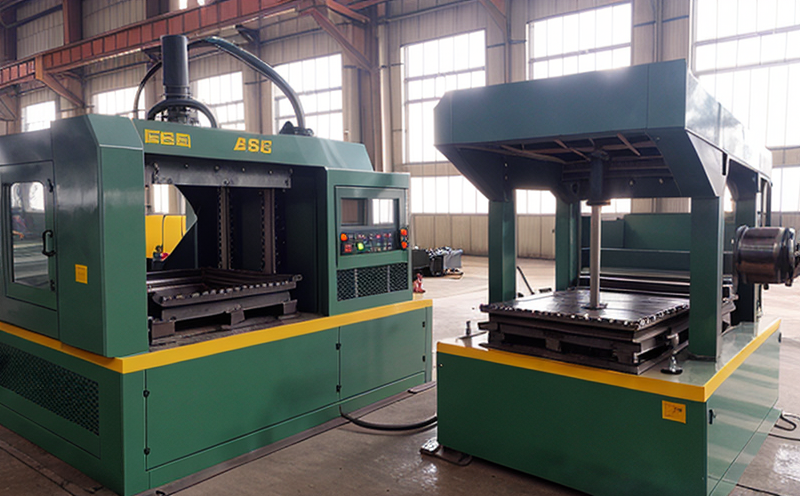ASTM A788 General Testing for Forged Steel Products
The ASTM A788 specification sets forth a comprehensive set of requirements and testing procedures aimed at ensuring the mechanical properties, quality, and reliability of forged steel products used in various industrial applications. This service is crucial for industries that demand high-strength materials capable of withstanding extreme conditions, such as aerospace, automotive manufacturing, oil and gas production, and heavy machinery fabrication.
The forging process involves shaping metals using force to achieve the desired configuration without melting them. Forged steel products are known for their superior mechanical properties compared to cast or wrought equivalents due to controlled grain flow and homogeneity throughout the metal matrix. ASTM A788 covers a range of carbon, alloy, and stainless steel grades that undergo this process.
The testing outlined in ASTM A788 is designed to evaluate critical parameters such as tensile strength, yield strength, elongation, hardness, impact toughness, and chemical composition. These tests are essential for verifying compliance with the material specifications and ensuring product integrity throughout its lifecycle. The service provided by our laboratory adheres strictly to these standards, using advanced testing equipment and rigorous quality control measures.
Forged steel products often find application in critical components where failure can have catastrophic consequences. For instance, aircraft landing gears, engine parts, and pressure vessel components rely heavily on the mechanical properties of forged steel. By adhering to ASTM A788, we ensure that these components meet stringent quality thresholds, thereby enhancing safety and operational reliability.
The testing process begins with careful sample preparation, where specimens are cut from larger forging lots in accordance with specified dimensions. This ensures a representative cross-section of the material for accurate testing. The laboratory employs state-of-the-art equipment such as tensile testers, hardness testers, impact testers, and chemical analyzers to perform these tests.
The results generated from ASTM A788 are detailed reports that include all test values along with acceptance criteria based on the specific grade of steel being evaluated. These reports serve as critical documentation for quality assurance departments within manufacturing plants, helping them make informed decisions about product release and ongoing process improvement.
Our laboratory has extensive experience in conducting ASTM A788 tests across different industries, ensuring that clients receive reliable data consistent with international standards. This service not only supports compliance requirements but also contributes to the continuous improvement of manufacturing processes by identifying areas for enhancement or corrective action.
Why It Matters
The importance of ASTM A788 testing cannot be overstated in industrial manufacturing and processing. Compliance with this standard ensures that forged steel products meet the stringent requirements set forth by industry leaders, thereby enhancing product reliability and safety.
- Enhanced Safety: Products subjected to ASTM A788 testing are less likely to fail under operational stress, reducing risks associated with mechanical failures.
- Regulatory Compliance: Adherence to international standards like ASTM A788 is often a requirement for export and import of materials, ensuring seamless trade across borders.
- Quality Assurance: Regular testing helps manufacturers maintain consistent product quality, which is vital for reputation building and customer satisfaction.
- Risk Management: By identifying potential issues early in the production cycle through rigorous testing, companies can mitigate risks associated with substandard products entering the market.
Quality and Reliability Assurance
Ensuring the quality and reliability of forged steel products is paramount in industries where safety and performance are non-negotiable. The ASTM A788 testing process plays a pivotal role in this endeavor by providing objective data that can be used to assess and improve manufacturing processes.
- Tensile Testing: This test measures the maximum stress a material can withstand before it breaks, offering insights into the steel's tensile strength. Compliance with specific tensile requirements is crucial for ensuring the structural integrity of components like engine parts and pressure vessels.
- Hardness Testing: Hardness testing assesses the resistance of materials to indentation by a hard object. Forged steels that meet specified hardness levels are more likely to withstand wear and tear, enhancing their longevity in demanding environments.
- Impact Testing: This test evaluates the energy absorbed during fracture, which is particularly important for assessing the toughness of steel alloys used in high-impact applications. Results from impact testing help determine if materials meet the necessary safety standards.
Environmental and Sustainability Contributions
Incorporating ASTM A788 testing into industrial processes not only ensures product quality but also contributes positively to environmental sustainability. By maintaining consistent high-quality forged steel products, industries can reduce waste associated with rejections due to substandard materials.
The use of advanced testing methods and adherence to international standards like ASTM A788 helps in optimizing resource utilization, leading to more efficient manufacturing processes. Additionally, the reliability provided by these tests ensures that products last longer, reducing the frequency of replacements and associated environmental impacts.
Our laboratory's commitment to sustainability extends beyond compliance; we actively engage with clients on how they can further reduce their carbon footprint through better material selection and process optimization informed by ASTM A788 test results.





